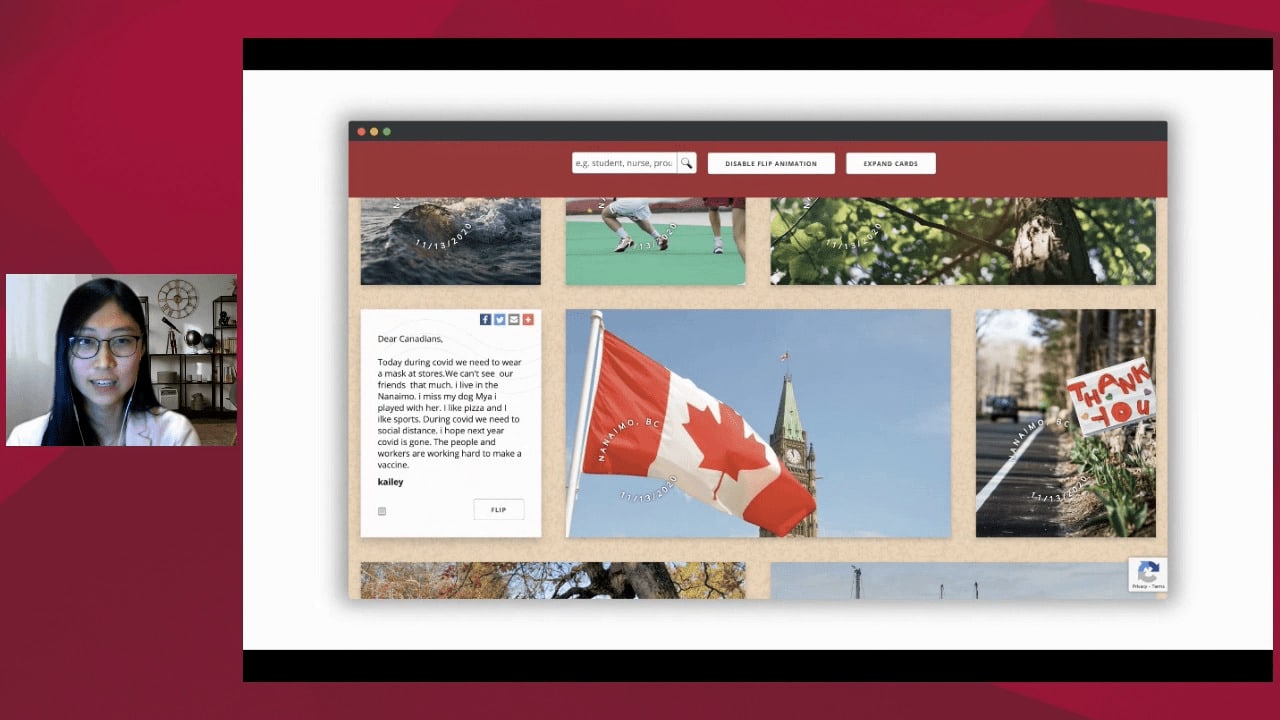Dear Harvard and Dear/Cher Canada: Connecting distanced communities
During the first few months of the COVID-19 pandemic, I led a project to connect distanced communities through a virtual postcard platform. We started with a platform built for the Harvard community, and then expanded nationally in Canada. We witnessed the stories of over a thousand participants, alongside tens of thousands of site visitors. Recently, I shared this project on the Main Stage of the 2nd Annual John A. Paulson School of Engineering and Applied Sciences-Harvard Business School Technology Showcase. The transcript of my presentation is below:
None of us will forget March, one year ago, when it seemed like an apocalyptic movie unfolded before our eyes. If you were on Harvard’s campus, you might remember a part of that experience being receiving countless emails addressed “Dear Members of the Harvard Community” from President Bacow, Harvard University Health Services, and many others. That greeting started to feel like a preamble for bad news, for announcing commencement and events being cancelled, and finally for sending us home a few days before spring break.
It struck me how depressing and one-sided those emails were. We didn’t have a chance to say our gratitude to Facilities and Maintenance Operations for quickly sanitizing every surface, or reflect on the moment as a community. In past crises, such as after the Boston Marathon Bombings, easels and message boards were setup in Science Center Plaza and other public spaces for the community to gather and share reflections. Obviously, those boards weren’t available this time.
I study communities and online platforms, so during the flight home and that really strange spring break, my friends and I thought about how to build a platform to create space for the Harvard community to gather and share these reflections and messages. At the same time, we also wanted this project to be forward looking towards the end of the pandemic and be a bridge between digital and physical spaces.
So, we built the Dear Harvard virtual postcard platform. Anyone who identifies as part of the Harvard community can create a virtual postcard. They can search for, or upload a photo, and write a message. We also worked with Harvard University Common Spaces, who helped us spread the word, but more importantly will help us turn these virtual cards into physical cards to be exhibited in Smith Campus Center when all of Harvard returns to Cambridge and Boston. We imagine these cards to be a connection and a physical testament to the now many months we all spent over Zoom.
Eventually, there was enough interest beyond Harvard to grow the project into a national platform in Canada (Dear/Cher Canada), in partnership with a broad coalition of corporate sponsors who donated to COVID-19 relief on behalf of our participants, NGOs, and celebrities. In Canada, we received cards from K-12 classrooms, retirements homes, politicians, Indigenous communities, and Canadians in every province. After the pandemic, those cards will eventually be archived through The Canadian Encyclopedia.
When we were building Dear/Cher Canada, we had a meeting with a prospective partner who asked us “why do we even need this platform when social media exists.” We explained that this platform is special because it’s a purposely designed space for deeper reflection, not quick status updates. Plus, it transcends social silos created by traditional social media. Everyone sees the same postcards and we specifically sought to be accessible and inclusive across many demographics, particularly across age. At a time when intergenerational connection was difficult both in-person and online, we wanted our space to have all kinds of people. We even created a paper version for retirement homes to submit their cards.
But to be honest, although we told our prospective partner all these things, and although we did user interviews and build MVPs like how Professor Tom Eisenmann taught us to, we had no actual idea if it was going to work or if what we said would turn out to be true.
Luckily, it did work. Across both the Harvard and Canada platforms, the postcards were incredibly thoughtful and often contained multiple paragraphs. There were messages of thanks, messages from the graduating class of 2020, hopes for the future, and commitments to personal and societal change. It was really an honour to carry these stories.
![]()
